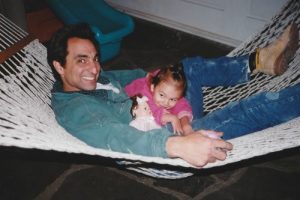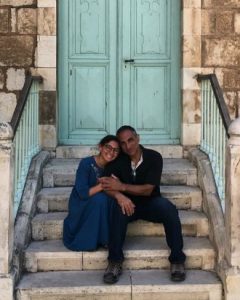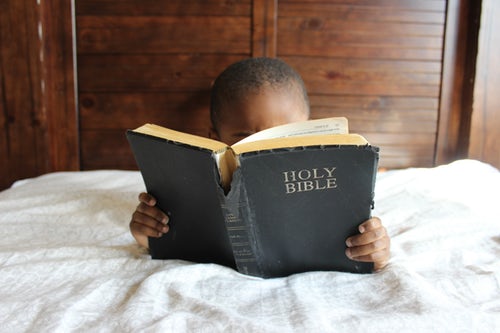A Former Investigator’s Customer Review
My dad has quite a unique relationship with The Church of Jesus Christ of Latter-day Saints. He went from having only one Latter-day Saint contact to having literally hundreds. All it took was marrying a then non-practicing “Mormon girl.”
My parents met soon after they fell away from the belief systems they were raised with. Frank, my dad, grew up Catholic. Went to Catholic school, the whole nine yards. My mom, Jen, was raised LDS. Went to BYU, the whole nine yards. At the point they met, they were both professional actors.

A few years later, they got married and had a baby (me!). Bringing life into the world gave my mom a resurgence of faith. She took me to church after years of inactivity. My siblings and I were raised as part of the gospel because of her decision to take me to church. I’m very grateful for the faith her choice instilled in me.
A Lone Catholic in a Sea of Saints
We moved across the country from diverse New Jersey to…less diverse Arizona when I was nine. My mom wanted to be closer to her family, so we went back to her roots. Mesa, Arizona, my mom’s hometown, is a Latter-day Saint hot spot. 436.521 Saints live in Arizona. Also, Arizona hosts six temples, six missions, and 926 congregations (updated to spring 2020).
My dad has observed, and to some degree participated in, the prevalent LDS culture surrounding him for the past 14 years as an Arizona resident. My parents eventually divorced, but my dad’s ties to the faith remained. His former spouse and children are LDS. Most of his in-laws are LDS. His neighbors are LDS. Many of his co-workers are LDS. The holiday parties he attends are usually in LDS meetinghouses. The wedding receptions he goes to are usually in LDS neighbors’ backyards.
His world, essentially, revolved around ward boundaries and scouting and mutual activities, just like the rest of our LDS family’s world does.
Best Dad Ever: a Daughter’s Testimonial
My dad hasn’t just tolerated the huge part of me that is my beliefs. He goes way beyond that. He embraces me wholeheartedly, even though he doesn’t agree with everything I believe.
He’s the one who drove me to BYU-Idaho my freshman year. We stopped at all the national parks on the way. A 16-hour drive became an important three-day journey. I was sent off the right way.
While on my mission, I always knew I would have an email from my dad waiting at the top of my inbox on P-day. I knew I was his top priority. During those two hours of precious email time every week, I wanted him to know he was my top priority too. I always emailed him first and spoke to him the most honestly.
More recently, he helped ease his family’s understandable feelings of tension about me getting married in a place they couldn’t be: the temple.

He has not only allowed me to grow up LDS, but he has also advocated me to grow up in this faith.
My gratitude for my dad has no limit.
Over the years, my dad has been through a few dozen sets of missionaries, home teachers, and friends eager to share the gospel. He said of these varied experiences, “I try to keep an open mind. There are parts of it that I agree with and I’m happy for. But there are other parts that just kind of…bug.”
I asked my dad to essentially give an honest “customer review” of his experience as someone who has seen all the tactics of sharing the gospel. We can leave customer reviews of essentially every other product and experience. Why not being the recipient of missionary work?
Here are Frank’s ten tips for those who want to share the gospel with their friends:
1. Take time to get to know people.

Most people aren’t on the lookout to make big life changes every day. What they are (usually) on the lookout for is a nice friend to pass mundane days with.
My dad has felt ostracized from past friend groups once he moves from one ward boundary to another— even if the new home is less than two miles from the old home. After four moves in Mesa, he’s grown tired of having to start over.
Because of how the system is set up, Frank’s friend groups shifted with his families’ ward boundaries. So much good could be done if friends from the old ward keep in touch with the person who leaves.
2. Before sharing anything, make sure they feel loved and accepted as they are.

My dad, of course, has had a lot of LDS friends want to share the gospel with him. He shares this insight into how he feels when shared LDS messages bombard him:
They believe it so much and they want you to believe it too. I know this is wrong, but it makes you kind of feel like they don’t accept you for who you are. They only accept you for who they want you to be.
If Frank’s friends had prefaced their gospel invitation with, “I love and accept you completely as you are,” then he probably would have seen their invitation in a different light.
3. Avoid leading questions.

Frank had missionaries over weekly during the 18 months I was on my mission. He figured that if he took care of the missionaries on the home front, then he could be assured that someone was taking care of me. Crazy logic, but it actually worked.
Some missionaries asked leading questions that turned Frank off to learning more. When they asked things like, “How does it feel to know you can be cleansed from sin?,” or “What are your thoughts on your potential to have an eternal family?” he felt like missionaries were asking him to swallow a pill that he was only starting to look into taking.
Leading questions like that made my dad feel that the missionaries didn’t see conversion as a process. They wanted him to be ready to accept everything on the spot, as they were teaching. He felt very uncomfortable because he was nowhere near that point of acceptance, but he really enjoyed having them over.
4. Phrase things carefully.

Some phrases that members of the Church say flippantly put my dad on edge. Based on how people discuss their beliefs, he has come to believe LDS people find no real merit in other world religions.
If someone denied that Latter-day Saints respect other world religions to our faces, we would, of course, refute that with a strong argument. However, when I heard what statements led my dad to believe that we don’t respect other religions, I could see where the confusion came from.
We absolutely can defend our beliefs of universal truth while also acknowledging that truth is out there, everywhere in the world. The Holy Ghost will testify of truth, wherever He finds it. That’s why we can feel peace in non-religious settings — like when we are engaged in a stimulating lecture, or when we look at a beautiful work of art, or when we are in nature.
Phrasing things more carefully can help our friends feel that our beliefs aren’t as divisive as they may have assumed.
5. Find common ground
If the Holy Ghost can, then we also can find merit and truth everywhere, including in different religions. That doesn’t mean we denounce our own beliefs. It just means we expand our vision.
Finding common ground can come in many forms. Stripping a belief system down into core beliefs and practices can help to find commonalities between two seemingly polar opposite religions.
Many religions— including some non-Christian religions— have some kind of belief in Jesus Christ. Many religions value Biblical teachings. Judaism’s book of scripture, the Tanakh, is what we call the Old Testament. Islam’s book of scripture, the Qur’an, alludes to many Old and New Testament stories. Many faiths engage in similar practices, such as fasting, prayer, and studying holy texts. Many religions also hold similar values, such as love, faith, hope, equality, forgiveness, and humanitarian work.
Devotion can take many forms; however, differing faiths are rich with common beliefs and practices. We can all be advocates of truth-seeking.
6. Realize they bring past spiritual experiences to the table.

We can sometimes make the mistake of assuming that we’re working with a clean slate when we’re sharing the gospel. Be careful to not disregard the experiences your friends have likely already had with God.
The universal Father and Creator is “no respecter of persons.” He has been part of their lives for a long time. Let them share their experiences, and validate those experiences by listening earnestly.
7. Be Authentic.

Along with listening and acknowledging others’ experiences, we can also share our own. My dad said he can tell when a missionary or a friend sharing the gospel is being genuine or not. He went on to say:
When missionaries aren’t afraid to put themselves into it, it really helps.
This goes for member missionaries as well. People can tell whether or not we’re being authentic. If we don’t share this vulnerable part of ourselves genuinely, then how can we expect them to be genuine in return?
8. Don’t let their interest level determine your friendship level.

Frank shared a story about losing one of his best friends after he declined the invitation to meet with the missionaries.
He’s a great guy, and after years being friends he said, “Have you ever thought about taking the lessons? If you want, we can set it up at my house at your convenience. No one has to know you’re taking the lessons, and you can decide for yourself if this is right for you or not. It’s just something if you want to experience I’d be happy to help you without any obligation.”
I responded, “I appreciate the time you’ve taken to tell me about it. I’ve already met with the missionaries.”
We saw each other a few times after that, but then that was it. So what’s that? That’s my only friend after 10-12 years of being here?
It makes me think that the whole time we were friends he had an ulterior motive. Like, I can be friends with non-Mormons as long as I can get them to be Mormon.
As difficult as it may be, it is just as important to befriend someone before sharing the gospel as it is to continue the friendship after the invitation has been declined. Clayton M. Christensen’s book, The Power of Everyday Missionaries, highlights inviting without conditions as an important principle of member missionary work.
9. There’s power in “I don’t know.”

From sore spots in Church history to new Church policies, there is a myriad of unanswerable questions. When one of our dear friends asks “Why?” we don’t need to have all the answers.
We may want to find an answer and present it the right way, but there is more power in saying “I don’t know” than in making something up. Our friends can feel the difference between a humble, genuine response and an unsupported defense.
Any question a friend has, even an unanswerable one, can direct someone to learn more about the gospel, according to Christensen.
10. Receiving feels as vulnerable as sharing.

The gospel is such a big part of our lives that when we share it with people, it feels like we’re sharing a part of ourselves.
My dad asked me why I thought his friends dropped him after he declined the invitation to learn more. He responded, “Why would they feel vulnerable? Because they asked?”
He didn’t ask this in a snarky way. He really wanted to know.
I realized that my dad always feels like the vulnerable one when people share the gospel with him. Saying “Will you…?” can be just as difficult and complex internally as saying, “No, thank you.”
We need to recognize that being asked to consider a different belief system than the one you were raised with feels very vulnerable. We may feel so nervous ourselves to share that we can overlook how they feel.
Reflection Time
At the end of my dad’s “customer review,” he expressed his true feelings about raising three LDS kids:
I’ve accepted you guys. When your mom wanted to bring you up LDS, I didn’t fight her on it. I was glad you had exposure to someone who was committed to a religion. It wasn’t me at the time, and your mom was. And then if you chose that path to follow, then that’s good. And if you didn’t and found another, then that’s fine too. But at least as kids you were exposed to something with Christianity that I could relate to. There’s the Old Testament, and the New Testament, and Adam and Eve and there’s so much about it that’s similar that I felt comfortable enough to have you exposed to it at such a young age to have a solid belief in something.
People can be accepting and tolerant of who we are without being ready to accept everything at this moment. What’s most important is that we give people good experiences within the LDS Church when they do want to be there. Choosing acceptance, love, and respect will help people see the Church in a good light so much easier than crafting an eloquent response to a question will.
As a non-Latter-day Saint living in an LDS bubble, my dad has had varied experiences within the Church. However, I feel safe and comfortable sharing my own spiritual experiences with my dad, because I know he accepts, loves, and respects me.
What I Love About Catholics, Baptists, Jehovah’s Witnesses, Scientologists and Buddhists
Clayton Christensen Shares his Expertise to Help ‘Everyday Missionaries’



